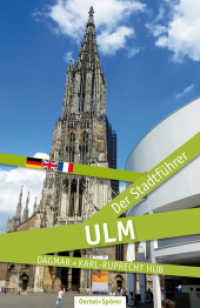- ホーム
- > 洋書
- > 英文書
- > Politics / International Relations
Full Description
This book explores the transformative role of social media in fostering reconciliation in the former Yugoslavia, a region still grappling with unresolved conflicts and ethnic divides. Focusing on platforms like YouTube and TikTok, it highlights how Balkan influencers blend personal storytelling with commercial outreach to promote interethnic understanding. The study employs digital ethnography and narrative analysis to reveal the intricate dynamics between human actors and algorithms, uncovering how social media facilitate grassroots reconciliation initiatives.
The author critiques traditional reconciliation efforts driven by political elites and emphasises the potential of bottom-up approaches enabled by social media. It presents the concept of "algorithmic reconciliation", where social media algorithms inadvertently foster interethnic collaborations and create transnational online communities. By examining the economic and cultural practices of influencers, the book illustrates how digital platforms can serve as modern arenas for peacebuilding.
This book is primarily aimed at undergraduates and postgraduates in social history, digital media studies, and peace studies, but will also be relevant to academics, policymakers, and anyone interested in the intersection of technology and social change.
Contents
Introduction 1. From Transitional Justice to Hashtag Strategies: Reconciliation Projects in Former Yugoslavia and Beyond 2. Transnationalism and Influencer Marketing as Informal Reconciliation 3. #Balkan: A Topological, Cultural, and Algorithmic Signifier 4. Exploring the Commodification of Balkan Stereotypes and Identity Reconstruction on YouTube and TikTok 5. Precarious Play Labour: Self-Commodification Strategies of Balkan Influencers 6. It's Complicated: The Relationship of Balkan Influencers with Platform Algorithms 7. The Quiet Peacebuilders: Hidden Reconciliation Practices on Social Media 8. Policy Recommendations 9. Conclusion








